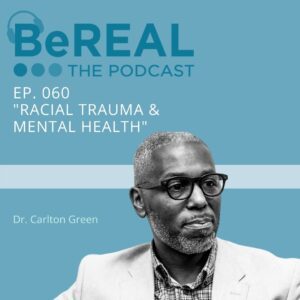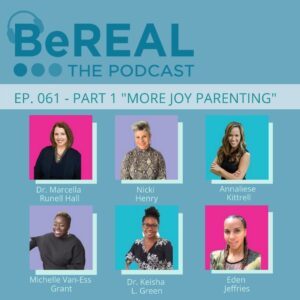Podcast: Play in new window | Download (Duration: 54:31 — 48.8MB) | Embed
Subscribe: Google Podcasts | RSS
Welcome back to BeREAL! This week, Diana and Ednesha are joined by Dr. Carlton Green to discuss diversity training, racial trauma and mental health.
For more than 25 years, Dr. Carlton Green (he/him) has held various roles in higher education settings. More specifically, he has worked in student activities, multicultural services, residence life, academic affairs, athletics, and counseling services in both public and private institutions. Dr. Green’s dedication to diversity and inclusion facilitated his appointment as the Multicultural Post-doctoral Fellow in Counseling and Psychological Services at the University of Houston.
Currently, Dr. Green is the Director of Diversity Training & Education in the Office of Diversity & Inclusion at the University of Maryland, College Park (UMD). Prior to taking on this role, he served as a Staff Psychologist at the University of Maryland (UMD) Counseling Center.
Dr. Green begins the episode by explaining how he got into his work around racial trauma and mental health. He originally wanted to be a lawyer, but through his university studies he realized that diversity training was a field that interested him more. As a proud Christian he blends his psychology training into the religious space. He has hosted pastoral counseling sessions in the past and other mental health services available to the church goers.
Dr. Green continues by comparing what he has observed about mental health in colleges versus churches. He notes that while they are both institutions that would like to believe they are not places where harm occurs, both places can deal a great bit of mental health harm, especially for people of color. He uses this idea to discuss how he organizes his racial trauma and mental health workshops. He begins by discussing how racism plays out in the outside world, and then brings the conversation into the space where the audience exists.
After a short break, the three therapists return to talk about the therapist-client relationship. The idea that the therapist is always the expert in the room inhibits the therapist’s ability to learn and grow from their client’s experiences. Other dynamics of the mental health field also create standards that are not optimal for minority clients. For example, the idea that the therapist should be a blank slate is not wanted by a lot of Black clients that Ednesha has seen. Ednesha continues by explaining that sometimes when she breaks the norm (made by white people) to accommodate her minority clients she feels guilty. However, Ednesha points out that it is important for minority therapists to affirm to themselves that they are good clinicians even when they break the traditional rules.
Lastly, Diana talks about what she learned from supervising Ednesha for so long. One thing she touches on is that the social work school institution needs to change to accommodate different traditions and cultural differences. The three therapists brainstorm some ideas of what a change in social work school would look like.
Thank you for tuning into BeREAL this week! Be on the lookout for a brand new episode next Tuesday. In the meantime, make sure to check out last week’s episode with Vanessa Rissetto about holistic nutrition coaching.
For more information on Dr. Green and his work, visit the links below:
Website: www.carltonegreen.com
Instagram: https://www.instagram.com/drcegreen/
Twitter: https://www.twitter.com/drcegreen/
For more information on BeREAL (our mental wellness podcast) and BeWELL (our therapy practice in New York City and Hoboken, NJ) visit the links below:
To schedule a therapy appointment text BeWELL to 484848 today



